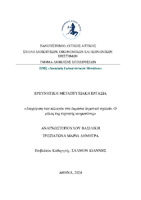| dc.contributor.advisor | Σαλμόν, Ιωάννης | |
| dc.contributor.author | Αναγνωστοπούλου, Βασιλική | |
| dc.contributor.author | Τρισπαγώνα, Μαρία - Δήμητρα | |
| dc.date.accessioned | 2024-10-24T06:59:38Z | |
| dc.date.available | 2024-10-24T06:59:38Z | |
| dc.date.issued | 2024-10-02 | |
| dc.identifier.uri | https://polynoe.lib.uniwa.gr/xmlui/handle/11400/7877 | |
| dc.identifier.uri | http://dx.doi.org/10.26265/polynoe-7709 | |
| dc.description.abstract | H Τεχνητή Νοημοσύνη (ΤΝ) αποτελεί την πιο πολυσυζητημένη έννοια των τελευταίων ετών. Η εμφάνισή της προκάλεσε ποικίλες αντιδράσεις ως προς τη χρήση της σε τομείς όπως η υγεία, η δημόσια διοίκηση, η οικονομία και η εκπαίδευση. Οι αλλαγές με τις οποίες ήρθαν αντιμέτωπες όλες οι χώρες προκάλεσαν με τη σειρά τους αλυσιδωτές τροποποιήσεις σε ό,τι μέχρι τώρα θεωρούνταν δεδομένο. Στην παρούσα εργασία μελετάται η ΤΝ στο πλαίσιο της εκπαιδευτικής διαδικασίας και οι αλλαγές που αυτή προκάλεσε σε τρεις Ευρωπαϊκές χώρες, την Ελλάδα, την Κροατία και τη Φινλανδία. Πιο συγκεκριμένα, εξετάστηκε ο τρόπος που προσαρμόστηκαν οι παραπάνω χώρες στην εμφάνιση των νέων συνθηκών αλλά και πως κατάφεραν να προσαρμοστούν θεσμοθετώντας νέες πολιτικές. Η έρευνα που πραγματοποιήθηκε είναι ποιοτική, μελετώντας διεξοδικά την κάθε χώρα τόσο για την ιστορική εξέλιξη της ΤΝ μέσα σ’ αυτήν αλλά και λαμβάνοντας υπόψιν τωρινά δεδομένα. Η μελέτη κατέδειξε προβάδισμα της Φινλανδίας στον ψηφιακό μετασχηματισμό, ενώ ακολουθεί η Ελλάδα και τέλος η Κροατία. | el |
| dc.format.extent | 80 | el |
| dc.language.iso | el | el |
| dc.publisher | Πανεπιστήμιο Δυτικής Αττικής | el |
| dc.rights | Αναφορά Δημιουργού - Μη Εμπορική Χρήση - Παρόμοια Διανομή 4.0 Διεθνές | * |
| dc.rights | Attribution-NonCommercial-NoDerivatives 4.0 Διεθνές | * |
| dc.rights.uri | http://creativecommons.org/licenses/by-nc-nd/4.0/ | * |
| dc.subject | Εκπαίδευση | el |
| dc.subject | Ψηφιακός μετασχηματισμός | el |
| dc.subject | Τεχνητή νοημοσύνη | el |
| dc.subject | Διαχείριση αλλαγών | el |
| dc.subject | Ηθικά ζητήματα | el |
| dc.subject | Artificial intelligence | el |
| dc.subject | Digital transformation | el |
| dc.subject | Education | el |
| dc.title | Διαχείριση των αλλαγών στο δημόσιο δημοτικό σχολείο. Ο ρόλος της τεχνητής νοημοσύνης | el |
| dc.title.alternative | Management of changes in public primary schools. The role of of artificial intelligence | el |
| dc.type | Μεταπτυχιακή διπλωματική εργασία | el |
| dc.contributor.committee | Psaromiligkos, Ioannis (Yannis) | |
| dc.contributor.committee | Spyridakos, Athanasios | |
| dc.contributor.faculty | Σχολή Διοικητικών, Οικονομικών & Κοινωνικών Επιστημών | el |
| dc.contributor.department | Τμήμα Διοίκησης Επιχειρήσεων | el |
| dc.contributor.master | Διοίκηση Εκπαιδευτικών Μονάδων | el |
| dc.description.abstracttranslated | Artificial Intelligence (AI) is the most discussed concept in recent years. Its emergence has provoked various reactions regarding its use in sectors such as healthcare, public administration, economy, and education. The changes faced by all countries have, in turn, triggered a domino of modifications in what was previously considered as a fact. This study examines AI in the context of the educational process and the changes it has caused in three European countries: Greece, Croatia, and Finland. Specifically, it examines the way these countries adapted to the emergence of new conditions and how they managed to adjust by introducing new policies. A qualitative research was followed and each country was studied in terms of both the historical evolution of AI and the current data. The study revealed that Finland has made the biggest steps in digital transformation, followed by Greece, and finally Croatia. | el |


